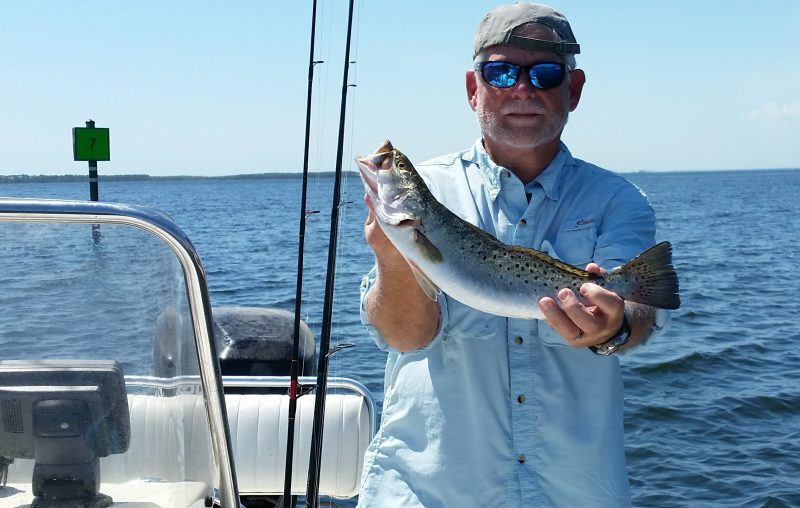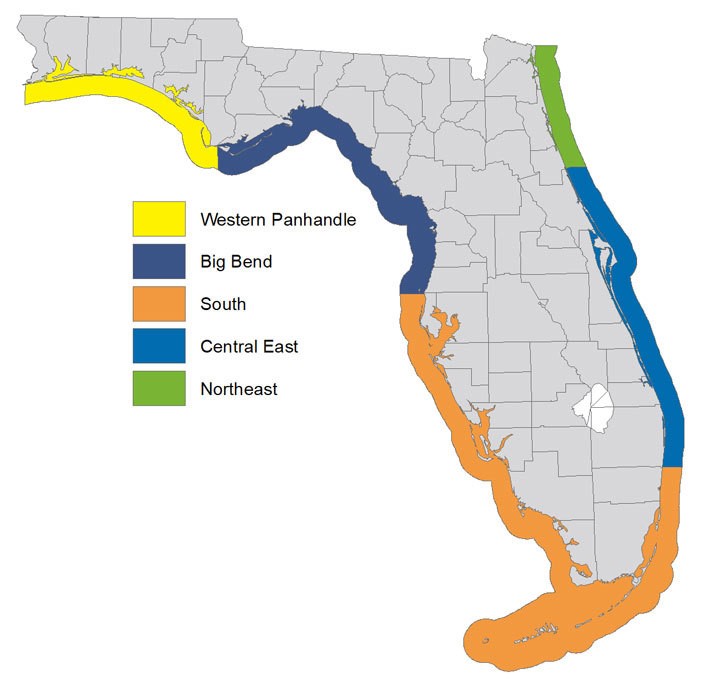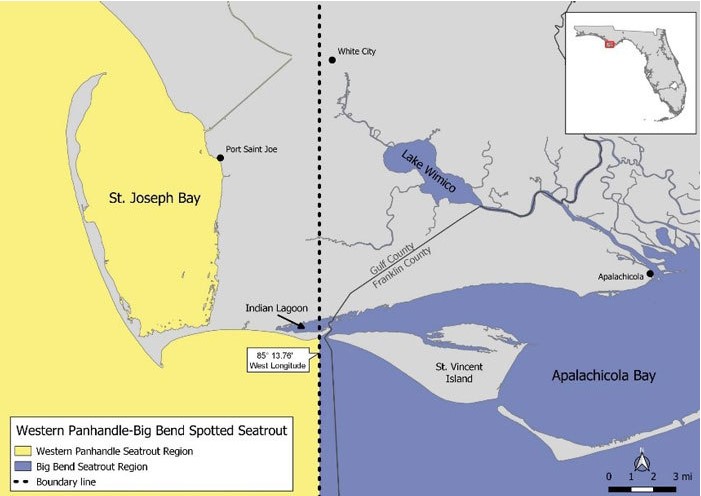
A spotted seatrout caught last summer in the St. Andrew’s Bay system (an area now included in the new Western Panhandle Management Zone). Photo credit: Mark Mauldin
Recently FWC (Florida Fish & Wildlife Conservation Commission) announced rule changes relating to spotted seatrout.
The text was taken directly from FWC press releases; details not pertinent to NW Florida were removed.
Several rule changes for spotted seatrout [went] into effect February 1, including a closure to spotted seatrout harvest in the new Western Panhandle management zone. Spotted seatrout are one of Florida’s most popular inshore fisheries. The Florida Fish and Wildlife Conservation Commission (FWC) made these changes after reviewing the results of a recent stock assessment and gathering input from anglers. These changes were made to benefit spotted seatrout populations while continuing to provide quality fishing opportunities.
The following rules [went] into effect Feb. 1, 2020:
- Creating two new zones by splitting the Northwest spotted seatrout management zone into the: (See maps below.)
- Western Panhandle (Escambia County through the portions of Gulf County west of longitude 85 degrees, 13.76 minutes but NOT including Indian Pass/Indian Lagoon).
- Big Bend (remaining portion of Gulf County plus Indian Lagoon, and Franklin County through Fred Howard Park Causeway in Pinellas County).
- Reducing bag limits
- Western Panhandle: three fish (was five).
- Big Bend: five fish (no change).
- Modifying the recreational slot size limit from 15-to-20 inches to 15-to-19 inches total length.
- Allowing one seatrout over 19 inches per vessel (currently per harvester).
- Prohibiting captain and crew from keeping a bag limit on a for-hire trip.
- Re-establishing the February recreational closure in the Western Panhandle zone.
Learn more about spotted seatrout by visiting MyFWC.com/Marine and clicking on “Recreational Regulations” and “Spotted Seatrout.”

Newly-approved FWC Spotted seatraout management zones, effective February 1, 2020. Image source: www.myfwc.com

New boundary between the Western Panhandle and Big Bend spotted seatrout management zones effective Feb. 1, 2020.
Image source: www.myfwc.com
Governor DeSantis announced the dates for the 2020 Gulf Red Snapper Season – June 11 through July 25.
Governor Ron DeSantis Announces 2020 Gulf Red Snapper Season
Tallahassee, Fla. – Governor Ron DeSantis announced the popular 2020 Gulf red snapper recreational season is set to open June 11 through July 25, with a possible fall reopening if quota is available. This season will apply to those fishing from private recreational vessels in Gulf state and federal waters, and to charter vessels that do not have a federal reef fish permit and are limited to fishing in state waters only.
Earlier this month, Florida was delegated authority to manage recreational red snapper harvest from private vessels in Gulf federal waters.
“I’m pleased to announce that our state’s good conservation practices are allowing us to have a 45-day Gulf red snapper season this year,” said Governor DeSantis. “Gulf red snapper season is always an exciting time for anglers and is just another reason why Florida remains the Fishing Capital of the World.”
“Gulf red snapper is a conservation and management success story for Florida anglers,” said Florida Fish and Wildlife Conservation Commission (FWC) chairman Robert Spottswood. “Just a few years ago, a 45-day season for red snapper in both state and federal waters was out of reach. Thank you to all the stakeholders and anglers who helped make this season possible by providing input and sharing information about their fishing trips.”
“FWC is proud to be able to work with our stakeholders to balance conservation with fishing opportunities for Gulf red snapper and we are excited to see what the future holds as FWC takes the unprecedented step of managing this resource in both state and federal waters of the Gulf,” said Spottswood.
For more on recreational snapper regulations, visit MyFWC.com/Marine and click on “Recreational Regulations” and “Snapper” under the “Reef Fish” tab.
Follow the link for more information on Snapper fishing in Florida – FWC Snappers
- 2026 Florida Bull Test Sale – Performance Data Evaluation Simplified - January 9, 2026
- Panhandle Corn & Soybean Update Friday – February 6 - January 9, 2026
- Peanut Maturity Update – 10/9/25 - October 10, 2025
